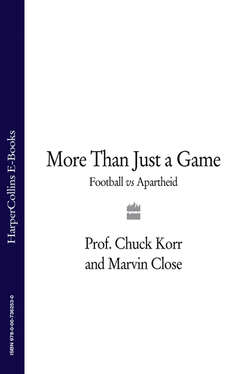Читать книгу More Than Just a Game: Football v Apartheid - Marvin Close - Страница 6
Introduction
Оглавление18 July 2007. Robben Island
It was an unlikely sight: football legends Pelé, Samuel Eto’o, Ruud Gullit, George Weah, and many other of the world’s top players gathered behind razor-wire prison fences and sentry towers on a tiny, windswept island 12 kilometres off the coast of Cape Town. They lined up on a bumpy, rutted pitch and took it in turns to shoot eighty-nine footballs into a set of rusting goal posts, one for each of Nelson Mandela’s years on his birthday.
They were there, along with FIFA officials, South African World Cup 2010 organizers, and prominent South African politicians to honour Mandela at the place with which he is most identified – Robben Island Prison: the high security jail that for three decades housed Mandela and thousands of other political prisoners.
But there was another reason that FIFA had chosen to stage this unorthodox birthday celebration on the ex-prison’s football pitch. Once the mighty band of football greats had finished striking the balls into the goal, five former prisoners, Anthony Suze, Sedick Isaacs, Lizo Sitoto, Mark Shinners, and Sipho Tshabalala, stepped out onto the grass and took centre stage. These men knew the pitch well, for they had laid, rolled, and irrigated it many years previously, and they had made the goal posts and nets with their own hands, from debris washed up on the shingle beach around Robben Island.
The five were unknown outside South Africa and scarcely known to anyone in their own country. They had survived long-term imprisonment on Robben Island by never losing faith that one day their fight would lead to a free South Africa, and football had played a major role in their battle. Though much has been written about how prisoners organized themselves politically on the island, the outside world knows little about how vitally important the game of football was to helping keep the men sane and focussed despite their cruel surroundings. Against all the odds, this dedicated bunch of prisoners spent four long years trying to persuade the prison authorities that they should be allowed to play organized football. Even more incredibly, they then kept the league, which they named the Makana Football Association, running for over twenty years, in accordance with strict FIFA rules, playing in weekly league fixtures, cup competitions, and friendly matches. This simple, universally popular sport became an impassioned symbol of resistance against apartheid.
FIFA’s top officials then strode out onto the pitch to formally welcome the men and to conduct a remarkable ceremony. For the first time in its history, football’s ruling body conferred membership on an organization, rather than a country or an individual. The recipient was the Makana Football Association. This public event was a measure of just how far the nation had come since the end of apartheid in 1990 and the subsequent declaration of a multi-racial South Africa. In a message read out at the Robben Island ceremony from FIFA President Sepp Blatter, he observed that what happened on Robben Island decades earlier showed just how football could give hope and make a difference in people’s lives.
Out on the pitch, a FIFA spokesman recounted that in 1971 when Tshabalala was released from Robben Island, he had written to his comrades telling them how proud he was they had mastered football, and that he hoped that someday they would meet ‘the giants of the game’. This dream had come true, for there they were, surrounded by some of the world’s best footballers. The ceremony brought together players in a dramatic reunion across generations and circumstance.
Before arriving on Robben Island, Nelson Mandela was hardly a keen football fan, but as he became increasingly interested in what the game meant to the men in the prison, it began to teach him important lessons about the unifying nature of sport. He became acutely aware, through smuggled information, just how much sports-obsessed Afrikaners were wounded by a succession of sports boycotts that effectively isolated South Africa from the rest of the world.
Throughout the 1960s and early 1970s, the country was globally banned from taking part in all team sports, plus many tournaments for individual sportsmen and women. It opened Mandela’s eyes to how important sport was to people across the world – and how important it was to their politics and sense of right and wrong. When South Africa staged the Rugby World Cup in 1995, Mandela famously posed for the world’s cameras, wearing the shirt of the team’s white captain Francois Pienaar. It was a highly symbolic act and demonstrated once again how the then president used sports as a way to forge national unity across racial lines.
This helps explain the significance of South Africa’s future hosting of the 2010 FIFA World Cup and why it is time to tell the extraordinary story of the Makana Football League. What follows is the incredible account of how this determined group of prisoners and freedom fighters used what Pelé called ‘the beautiful game’ to bring a sense of dignity to one of the ugliest hellholes on Earth. How against all odds, they turned football into an active force in their struggle for freedom.
The cover of this book shows the only known photograph in existence of the prisoners playing organized football on the island. This image was taken by a member of the South African security services in the 1960s, and subsequently passed on to the international press as part of a carefully orchestrated propaganda exercise to reassure the world just how well prisoners were being treated on Robben Island at the time.
Notice that the faces of the players have all been blacked out and obscured. The apartheid authorities steadfastly refused to view the prisoners as human beings or individuals. They were faceless terrorists, without names, known only by their prison numbers. We hope that this book puts the faces back onto these players.
